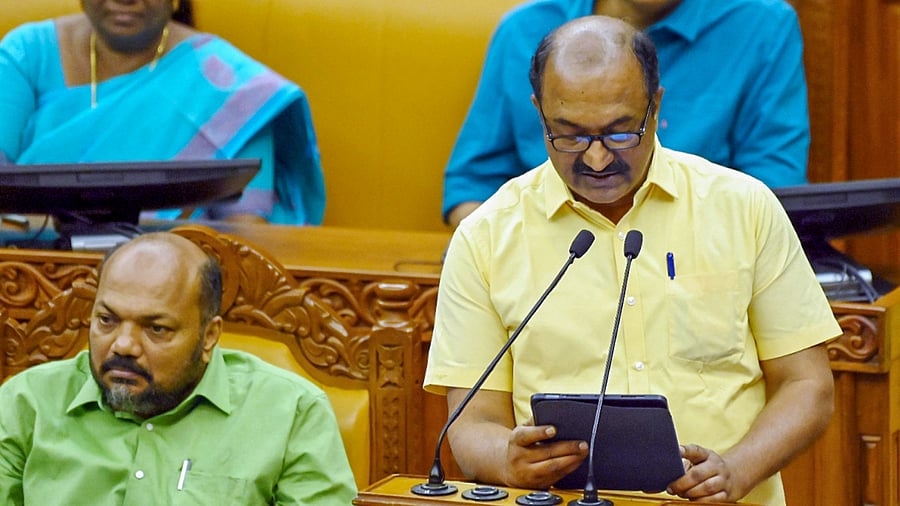
Kerala Finance Minister KN Balagopal presents the State Budget in the Assembly.
Credit: PTI Photo
The GST Council has decided on rationalising tax slabs, amid concerns raised by Opposition-ruled states about revenue loss. Kerala Finance Minister KN Balagopal, who attended the meeting, spoke to DH’s Shemin Joy on the deliberations and their concerns.
The GST Council has rationalised the tax rates. Are you satisfied with the outcome?
There has been doubts whether prices will really come down in a significant way. Kerala has also recognised this as an institutional concern. Eight states have discussed this issue as well as it was mentioned in meetings of the Group of Ministers and collective forums of states.
We want that the benefits of tax reduction should result in lowering of prices. But very often, that does not happen. Traders and companies tend to keep the benefit of the tax cut for themselves. So far, the timing for any real benefit to consumers has not come.
Since there is no anti-profiteering mechanism in place, the government must ensure this transfer of benefit happens.
That is the most important demand. Another issue we raised was about revenue loss for states. In Kerala alone, there will be an annual loss of Rs 8,000-10,000 crore. This is the money the government uses to fund healthcare, pensions, school education and basic public institutions. With such a shortfall, funds for these essential services will shrink. Therefore, to prevent this there must be a proper compensation mechanism. We wanted a guarantee on a concrete compensation arrangement.
We highlighted the losses the state incurred when GST was implemented. Instead of discussing these issues, the Centre chose to ignore them. The union government took a unilateral stance. We told them that there is no need to collect new tax for providing compensation. We are not asking for imposing new taxes. Already, there is a compensation cess, which will end in October. Some items like tobacco attract 100-120 per cent taxes.
They can use this as a special fund to provide compensation to states. But that suggestion was not accepted. If this situation continues, states’ finances will face severe problems. Across India, states together could lose around Rs two lakh crore. That is a massive blow, and when such a loss happens, there must be a way to cover it. These two concerns – ensuring consumers benefit from tax cuts and protecting states from revenue loss – are directly linked to the health of our public finances and governance systems.
Eight opposition-ruled states have jointly written to Finance Minister Nirmala Sitharaman. Were your concerns appreciated?
The issues raised were relevant not only to eight states nor is it a matter of opposition versus ruling coalition. This is a problem for every state, because the issue of revenue loss affects all of them. We wanted a discussion but it was treated just as a political demand.
Once the BJP had taken a decision, the party-ruled state governments did not have the freedom to speak against it openly. But we pointed out the problem clearly and consistently. This is an issue concerning the functioning of all states, not just one or two.
The larger concern is that no serious study has been conducted to assess the scale of the revenue loss. It is like during demonetisation when they went ahead without proper study. Similarly, here too, there is uncertainty about how much revenue loss will actually occur. Even though we submitted a detailed letter highlighting these concerns, and the letter was broadly constructive, the Centre responded by simply saying that there would be no financial difficulty. But in truth, no proper study has been done, no report has been shared. Each item should have been studied in detail by competent institutions, but that has not happened.
In the GST Council meeting, did BJP Finance Ministers respond to concerns raised by the Opposition-ruled states?
In the meetings of the Group of Ministers, even BJP-ruled states had spoken about losses. But in the GST Council, they were not prepared to say anything different. After the Prime Minister and the BJP had taken a decision, there was no scope for real discussion from them.
Was there an attempt to force a vote on the demand for compensation to states?
None of us were against tax rationalisation. So we were not for a vote on the question of tax rationalisation. Our point was specifically about revenue loss. On that issue, we expressed our strong view, but it was brushed aside and not accepted. Instead of treating this as a genuine fiscal issue, some saw it as a political one rather than an economic or systemic concern. We also said that there is already money being collected through cesses and surcharges and that could be used to offset losses if they arise.
A major concern is about whether the rationalising of the tax slabs will actually reach consumers. How did the GST Council approach these concerns?
No substantial discussion happened on it. To implement such a major reform, none of the necessary safeguards are in place. Earlier, there was an anti-profiteering mechanism in place, but now it is no longer active. So, if someone wrongly withholds benefits, there is no mechanism to act against them.
The Finance Minister and Revenue Secretary Arvind Srivastava argue that it is too early to talk about revenue loss, as the GST rationalisation is expected to increase consumption. Do you agree with this position?
Usually, whenever such major changes are made, a detailed study is conducted for each item. But here, no such study has been done. Yet the Centre claims there will be no problem. That is simply not correct.
